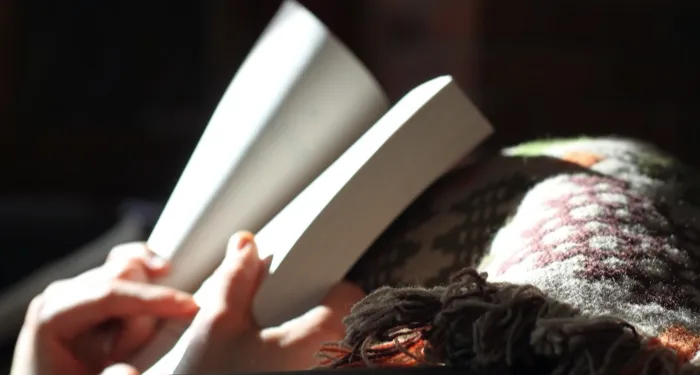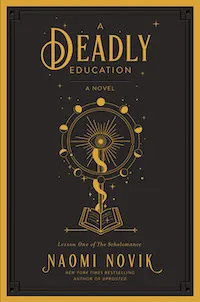
A Response to Claims of Racism in Naomi Novik’s A DEADLY EDUCATION
It’s true that racist undertones in books should always be called out. However, I think that sometimes, it is possible to read into a book things that aren’t necessarily there. We should be careful of suggesting that there’s a ‘correct’ way to portray the experiences of certain characters, particularly when the identity under discussion is as heterogenous as race.
Here’s a little bit of background, if you’re new to the story. In April of this year, I read an ARC of A Deadly Education, bestselling fantasy author Naomi Novik’s latest offering. I did have reservations going in: almost everyone raves about her last two books, Uprooted and Spinning Silver, but I found those pretty mediocre. A Deadly Education, though, blew me away. It features El, an antisocial half-Indian, half-Welsh protagonist living in the Scholomance, a deadly school for teenaged magicians where monsters lurk around every corner and try to kill you ALL THE TIME. There are no teachers and no holidays. You either graduate…or you die. It’s a fantastic premise, executed flawlessly, and when it was published this September, I fully expected people to fall in love with it like I had.
Mostly, they did. In October, however, a reviewer called the book out for a perceived racist approach to a wide range of issues. Some of the concerns raised are certainly valid. One paragraph, for instance, discusses how monsters might attach themselves to dreadlocked hair, laying eggs in them. Locs (the preferred name for dreadlocks) have historically racist associations with dirtiness. While contextually, the book is seeking to make a point about how long hair in general attracts monsters, Novik has rightly apologized for singling out a hairstyle connected to Black people. The passage will be cut from later copies, and this incident has highlighted how important it is for white authors not to make missteps when writing about backgrounds they don’t personally identify with, even when the background is unconnected to a specific character.
The conversation about locs was clearly a necessary one. The fact that this paragraph slipped in shows how pervasive historically racist perceptions can be, even when a writer is trying to showcase diverse viewpoints, and therefore how much work is still left to be done. However, I think other accusations of racism are less justified. One of the biggest issues is language. The magic in A Deadly Education is based on your knowledge of language: what you can speak dictates which textbooks you receive and which spells you can learn. The criticism points out that El tends to view people and group them by their knowledge of languages. We have the ‘Mandarin speakers’, for example, or the ‘Hindi speakers’, and more. I do not believe this is El (or Novik) being actively racist. This is because she is really, really antisocial, struggles to connect with her classmates, and — in a world where languages literally mean everything — of course she would identify them by the words they can speak, and therefore the magic they can perform. There’s a great post here by a Chinese reviewer which goes into more depth about Novik’s approach to categorisations and descriptions.
Another element of this accusation is that words in Spanish or French get written out in the text. Meanwhile, languages like Mandarin are ‘narrated away’. There’s a reason for that: those languages use the Latin alphabet, and Mandarin does not. It isn’t a sign of privileging Spanish, it’s simply the fact that the book itself is in English. For instance, I personally can read and write Arabic, but most people in the west cannot. It would be pointless for me to include snippets of the Arabic script in a book when most of my readership can’t even sound out the letters.
As for Novik’s portrayal of a brown protagonist: there’s no set way to portray a minority-background life, and El is under no obligation to ‘prove’ her Indian heritage. I’m a Muslim; of course, I would love to see more Muslim characters in mainstream literature. While #OwnVoices writers should always be supported, I also want non-Muslim authors to feel free to feature Muslims. Obviously they should research basic facts. I wouldn’t be impressed if a writer made their heroine pray seven times a day instead of five, for example. But there are all sorts of Muslim experiences. The heroine might wear a hijab, or she might not. She might pray, or she might not, and she might fast, or she might not. We shouldn’t criticise her, as a character, for not demonstrating this element of her background enough.
The same is true of a non-white person’s life. It makes complete sense to me that El, raised in Wales by a Welsh mother and never knowing her Indian family, would not call them by Indian terms. Why would she, when she’s never been around them? Many immigrant children feel the same way. This is especially true when nobody else from their extended family lives in the same western country that they do. I myself was born in Bangladesh, but I’ve never lived there; I grew up in Hong Kong and London as a first generation immigrant. Like El, I call my Bangladeshi family members by English names such as ‘grandma’ and ‘aunt’, not ‘nani’ and ‘khalamoni’.
I therefore find it unfair to say that El’s lack of connection to her Indian relations is a sign of Novik’s laziness and unwillingness to portray an authentically Asian character. Can someone only be truly non-white if their non-whiteness plays a leading role in the story? That seems to me to invite racist interpretations. To claim that El should have shown more of a connection to her Indian classmates simply because she is half-Indian is to relegate her into a very limiting box made up of her race.
Negative reviews have also suggested that there are terrible ‘optics’ to the fact that half-Indian El rarely showers. But…everyone in the school rarely showers. Monsters are lurking in the bathroom and showers are a route to almost certain death. This has absolutely nothing to do with her brownness and everything to do with the fantasy world.
To be clear, it’s understandable why there has been valid criticism of this book. Novik can and should do better. However, I don’t believe she should be criticised for not making her heroine conform to preconceived notions of how non-white characters act. I urge you to read it for yourself and see what you think.





